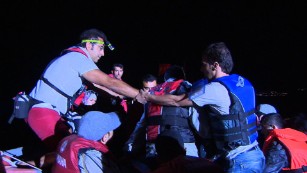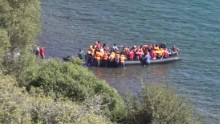Syrian refugees swarm Turkish port city hoping to catch boats to new lives
European countries should get ready. There are many more refugees on the way.
The cafes and street corners of this Turkish port city were jammed with refugees from Syria on Tuesday. Most carried backpacks with belongings and garbage bags full of life jackets, waiting for the call from smugglers.
When the call came, they left on different buses and headed down to the coast. There, they planned to catch boats that would try to smuggle them across the Aegean Sea to nearby islands in Greece.
There is so much sea smuggling traffic taking place here that several shops in this part of Izmir prominently display life jackets in their windows.
Racks of fluorescent orange life jackets also hung outside a barber shop next to a sign in Arabic that said "we have life jackets here."
Their eyes are on the heart of Europe
Europe's migration crisis in 20 photos


"We want to go to Germany," announced a Syrian man who, with his wife and two children, was part of a group of 20 people who had just arrived in Turkey from Damascus the previous day.
They described themselves as internally displaced people, men and women who had been forced by the conflict to abandon properties and businesses in towns such as Douma, Afrin and Kobani and move to the Syrian capital of Damascus. There, they complained of a lack of running water and electricity, as well as the threat of arrest at security checkpoints.
No one wanted to identify themselves for fear of possible reprisal to relatives who stayed behind in Syria.
Moonlight rescues as migrants paddle from Turkey to Greece
Asked why he was risking the lives of his children on an illegal and potentially lethal sea-borne passage, another Syrian man standing next to his son and daughter answered, "In Syria, they are dead already."
The refugees said there was a fixed price, $1,300, for passage to Greece.
In some cases, the crossing is being carried out in daylight.
On the morning of August 31, journalist Ibrahim Karci counted seven boats packed with migrants depart during a six-hour period from a stretch of coastline near the Turkey's Assos region.
Footage filmed by Karci shows more than 30 migrants loaded aboard a black, inflated pontoon boat. They wore life jackets and carried inner tubes in case of an accident.
A group of four Turkish men shoved the boat out into the water. Moments later, a Turkish man piloting the vessel could be heard sayingm "Did you understand? Did you understand?"
Then, the bare-chested man abandoned ship, diving off the back of the boat and swimming back towards shore.
The migrants apparently did not know how to steer the boat. For several minutes, it motored in tight circles as the group of smugglers on shore hurled abuse and curses at the migrants. Finally, the rubber boat straightened out and began motoring across the sea in the direction of the Greek island of Lesbos. It followed another migrant boat already heading out towards the island.
Meanwhile, dozens of other migrants dressed in life jackets sat patiently on shore under olive trees, waiting for their turn to set sail for Greece.
'I just want a peaceful life'
On Tuesday, a U.N. official on Lesbos told CNN the island was receiving more than 1,000 new migrants a day.

Refugees rescued at sea
"There are about 30,000 refugees on the Greek islands right now," Melissa Fleming, a spokeswoman for the U.N. High Commissioner for Refugees, told journalists in a briefing. She said the majority, an estimated 20,000 refugees, were on Lesbos.
"We don't have any other choice," explained a young man named Mohammed, who spoke to CNN in Izmir on Tuesday, while waiting to make the sea passage to Greece.
A fluent English-speaking resident of Damascus, Mohammed said he sold his mother's car to pay for his trip to Europe. He had been in Turkey only one week but had already failed at a previous attempt at making the crossing to Greece.
"What can I do? Stay in Syria?" he asked, adding that he was fleeing government efforts to conscript young men into the military.
"I don't want to fight anyone. I don't want to kill. [And] I don't want to be killed," he explained.
"I just want a peaceful life," he added.
Another young man from the northern opposition-controlled town of Binnish told CNN that he had made four previous failed attempts to reach Greece.
News Courtesy: www.cnn.com











